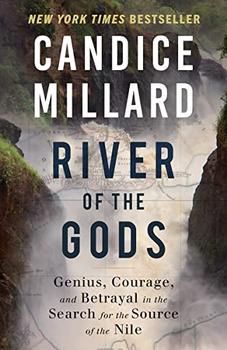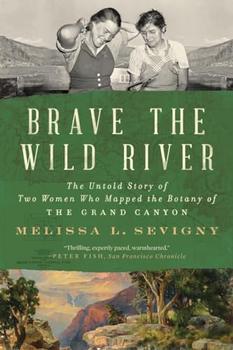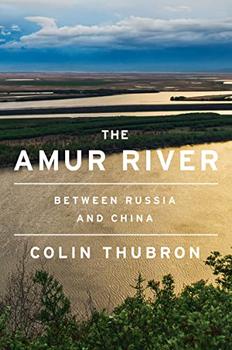Summary | Excerpt | Reviews | Beyond the book | Read-Alikes | Genres & Themes | Author Bio

Genius, Courage, and Betrayal in the Search for the Source of the Nile
by Candice MillardThe Nile River has provided vital resources for millennia, serving as a source of water, food and transportation for numerous peoples. The river's richness allowed for the development and flourishing of large civilizations — including Ancient Egypt — in lands that were otherwise largely desert. But where did the Nile's water come from? It was a question that many had asked but that remained unanswered until the 19th century. Following the discovery of the Rosetta Stone, British interest in Ancient Egypt increased exponentially, fueling curiosity about the source of the Nile. River of the Gods by Candice Millard is the account of Richard Burton and John Speke, two British explorers sent to search for the answer to this ancient mystery, as well as their guide, a formerly enslaved African man named Sidi Mubarak Bombay (see Beyond the Book).
Speke and Burton's first expedition in 1856 failed spectacularly, with both men suffering serious injuries and blows to their reputations. A second expedition was funded two years later, but issues arose almost immediately. Millard shares the numerous setbacks these explorers faced, including illnesses, the deaths of pack animals, desertions, lost and stolen supplies and harsh weather. Her descriptions of Burton, Speke and the rest of the party's maladies are particularly detailed, so much so that some readers may find themselves uncomfortable. She describes, for instance, a beetle burrowing into Speke's ear canal, and the resulting infection after the insect is killed with a penknife. Such detail, while gruesome, shows exactly how much these men overcame to complete their expedition and make it back to England.
Despite surviving such an ordeal together, there was no love lost between Burton and Speke. As much as River of Gods is a tale of adventure and discovery, it's also the story of the feud between these two men, a feud that would last until Speke's untimely death. The animosity between them was largely due to differences in character. Burton was a well-known scholar and explorer, and his experiences led him to dismiss the opinions of others. Speke, although a captain in the British Army and an avid huntsman, had less experience as an explorer but bristled at Burton's arrogance and leadership.
An additional point of enmity was the believed source of the Nile: Burton thought they had found it at Lake Tanganyika, while Speke believed he alone had discovered the headwaters at Lake Nyanza (both are part of the African Great Lakes in eastern central Africa, roughly 200 miles apart at the closest point). Speke was right, although he had no hard evidence to support his theory and he would only be proven correct many years after his death. Lake Tanganyika drains into the Congo River, the second-longest river in Africa after the Nile. Speke was the first to return to Britain after the journey, and his version of events made him out to be a hero and Burton a lazy, pompous, broken man whose actions almost prevented his partner's success. Millard spares no detail in describing Speke's slander, and the ruin of Burton's reputation at his former companion's hands is difficult to read, as is Speke's descent into a ceaseless rage that cost him his good name and may have contributed to his death.
Millard ends by discussing the various problems of historic British exploration, mainly that these explorers never truly discovered anything. Rather, they ventured into lands that had often been known and inhabited for centuries if not longer; people such as the Gusii and Luhya had been living around Lake Nyanza long before Speke first set eyes on its waters, possibly as early as the 16th century. Additionally, Millard points out that these explorers frequently relied on local guides and translators to make their way through foreign lands, yet these individuals were rarely acknowledged. In the case of Burton and Speke's second expedition, Sidi Mubarak Bombay served an essential role as guide, translator and friend, and he eventually became famous in his own right as an explorer. In general, indigenous people who were not part of the expedition were seen as either friends or enemies depending on what they could provide the traveling party, and often labeled primitive or greedy savages by British explorers with ethnocentric beliefs.
River of the Gods, much like Millard's previous books, is a story of courage and perseverance, but it's also a harsh look at the history of British exploration and the tragedy of pride and betrayal. Filled with stunning detail, fascinating individuals and important historical context, it's a true story that takes readers on a harrowing and unforgettable adventure.
![]() This review was originally published in The BookBrowse Review in June 2022, and has been updated for the
June 2023 edition.
Click here to go to this issue.
This review was originally published in The BookBrowse Review in June 2022, and has been updated for the
June 2023 edition.
Click here to go to this issue.

If you liked River of the Gods, try these:

by Melissa L. Sevigny
Published 2024
The riveting tale of two pioneering botanists and their historic boat trip down the Colorado River and through the Grand Canyon.

by Colin Thubron
Published 2022
The most admired travel writer of our time - author of Shadow of the Silk Road and To a Mountain in Tibet - recounts an eye-opening, often perilous journey along a little known Far East Asian river that for over a thousand miles forms the highly contested border between Russia and China.
Your guide toexceptional books
BookBrowse seeks out and recommends the best in contemporary fiction and nonfiction—books that not only engage and entertain but also deepen our understanding of ourselves and the world around us.